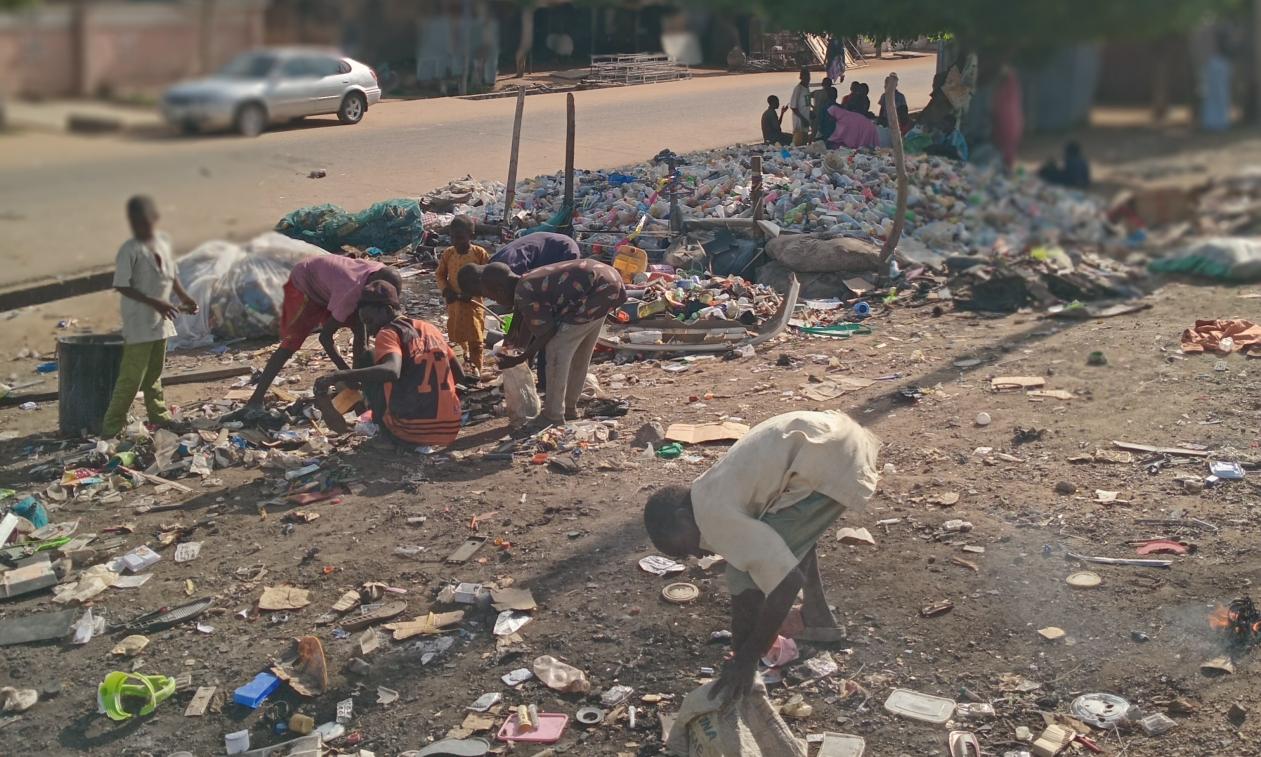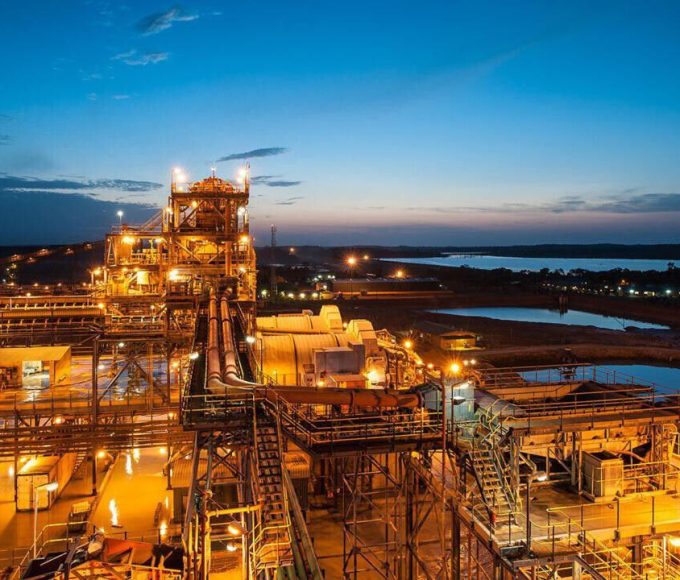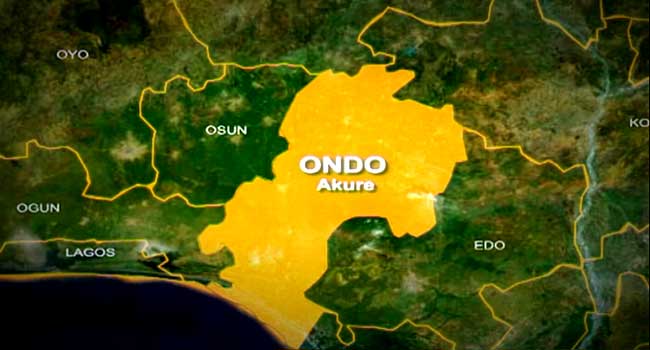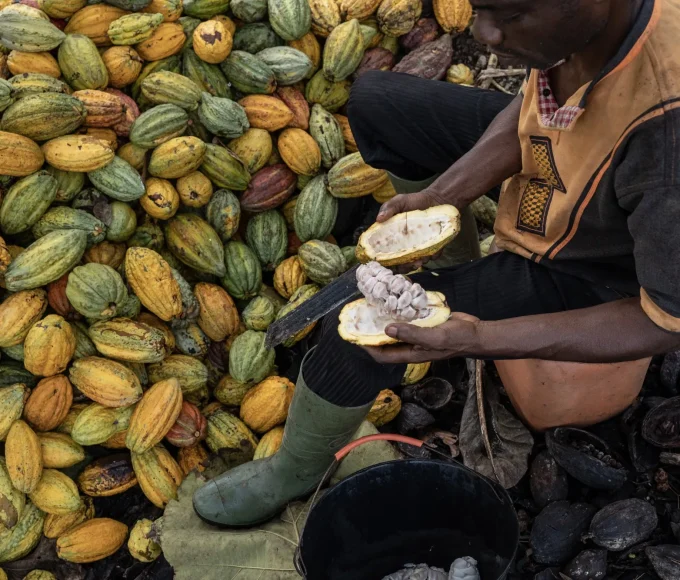
Surviving Poverty Through Pollution: A Day in the Life of Adamawa Bola Boys

Before leaving Lagos, I was sure that I had left behind memories like the awful smell that engulfed the megacities, while I looked forward to Adamawa’s fresh air. After three days spent inside a bus from Lagos to Adamawa, the stink smell of rubbish, like those mountains of refuse you find in Olusosun landfill in Lagos, was what hit me on arriving in Yola. So I asked: “Is Adamawa smelling?”
Adamawa is Smelling
For every non-indigene coming into Yola for the first time, they are either hit by the smell or by flies lazily buzzing over piles of refuse. Along the Doubele road down to Vinikilang-Adamawa, the most polluted area, the smell hits you before the sight.
The city along this road fades into sprawling settlements of mountains’ refuse piled up beside the busy highway, with small kiosks and rickety homes. Plastic bottles, rusted irons, torn sandals, spoiled food, and discarded fabrics rot together in the open, attracting flies and vultures that hover overhead. You can guess that’s definitely a potential hotspot for cholera, malaria and other disease outbreaks- a trademark of neglect and failed waste management.
But here in Doubele, there’s something more beyond the heaps of waste. This pollution is not just a nuisance; it is a matter of survival. For many here, survival comes from the waste others discard. From men, women, and children scavenging for old clothes, plastic bottles, and metals, to small kiosk owners who trade from scrap, buying cheap from scavengers to reselling to buyers coming from outside the state who buy in bulk. The refuse, dangerous as it is, feeds an economy that keeps hundreds alive.
This is a scene one would not expect; however, at every corner, you find children balancing sacks of bottles on their heads, women bending to sort through discarded shoes, and men gagging over piles of plastic and metal.
This is the story of the Bola Boys and the Double Community, where I spent a day trying to understand how pollution has become their lifeline and survival.
Gidan Bola. No Gidan, No Bola
Across the refuse site, among many of the small kiosks, stands a small kiosk with rusted zinc roofing, leaning against the wind. Inside, I met Gidng, a 28-year-old who has been running this makeshift shop for three years. His kiosk is not like the regular traditional store stocked with factory goods. It is one of those marketplaces for refuse-turned-commodities. He tells me while leaning against the counter. His hands are rough, probably from years of lifting metal scraps. “But we quarrelled. He left. I sold my phone to pay my debts and started again alone.”
Around his shop, children and the older ones, known assbola’s, stocked it, selling to him. He buys plastic bottles or old iron for as little as ₦150 per kilo and resells them for ₦200 or more, depending on good months. He says he makes ₦40,000 and ₦50,000, which, according to him, is barely enough to keep him afloat.
He insists there’s little left for personal comfort. “There is no wife, no children. We are just working,” he says with a small, harsh laugh. “We don’t have money for ourselves. If you want to rent a small house here, it is ₦3,000 to ₦5,000 per month. So everything I get, I use it to survive.”
While trying to survive on his daily sales, Gidan has grown used to harassment from police raids and, sometimes, from locals. One of the challenges they face in their work is police harassment, which, in most cases, is set up.
“Police come, especially when children bring things. Sometimes they accuse us, and after they know the truth, they still ask us to pay. We settle them. That is how it goes.”
Despite the constant harassment and stress, he insists on being happy and satisfied with what he is doing. “Every day, I am satisfied. I eat, I buy small things, I even dash people’s money,” he says. To him, his work, however stigmatised, gives him a sense of independence.
If the government eventually decides to do the right thing by clearing the dumps, Gidan admits he would have nothing left. “Maybe I will go back to my village. For now, this is all I have.” Gidan is from Bauchi.
I Want To Buy RAM and Sell During Sallah
A few meters from Gidan’s shop, I met Sunanada Muhammad, a 13-year-old bola boy. Stuck with his sack bag, his small frame is half-hidden under the pile of plastic bottles he has stuffed into it. With sweat rushing over his forehead, he flashes a shy smile when asked about how long he has been doing this work.
“Since I was 10 years old,” he says. “My father used to do it. After he died, I continued.”
From his home in Nundi, Sunanada comes to the dump daily. Just like every other child like him, he comes around every day to join them in combing through the waste, gathering plastic bottles and other recyclables. On an average day, he collects at least ₦500 if he can gather as many recyclables as possible. If he collects 500 plastic bottles, he would earn about ₦2000 by reselling them.
By the end of the month, Sunanada can save as much as ₦10,000, which goes toward his education and personal dreams. “I save my money. I need to pay my school fees. Sometimes I can make ₦10,000 in a month if I don’t spend too much.”
Does he plan to stop? With a shy smile, he shakes his head. “I can’t stop. I need money”
Like many other children in his line of work, Sunanada tries to balance his work with school. He attends classes in Nundi, but every afternoon, he returns to the dumps to scavenge. His dream for now is modest: he wants to save enough to buy a ram, and sell it during Sallah. “Sometimes I am happy because I am saving,” he says. “But sometimes I am angry, because I have to give my money away.”
However, according to UNICEF, child labour remains widespread across northern Nigeria, where many children are forced into hazardous work to support their families. Sunanada, just like other children, is among the thousands of Nigerian children caught between poverty and survival.
They Are Surviving
Because I need to understand how the members of this local community view life on waste, I met Abu Umar, a 56-year-old man who has lived in the area for more than 30 years.
“People use the refuse in different ways,” he says. “The children make their money here. What can you say? They are surviving.”
Umar believes the refuse is a resource. Families and children survive by it, and though the dangers of disease and pollution loom at large, he thinks the community has long come to adapt. The dumps have become part of his life here for three decades.
Yet, the consequences are evident everywhere. The risk of waterborne disease is real. There are cholera outbreaks during the rainy season, which claim lives each year. Malaria is constant. Open waste contaminates streams and shallow wells, making clean water a luxury. Despite these risks, residents like Umar largely ignore them.
Policy With No Plan B
“The government came once to shift the refuse; since then, the government has not come. No one clears it. So people find a way.” Umar says
In August 2024, the Adamawa state government issued an executive order banning all scavenging and criminalising rummaging through waste. Scavengers could face up to 6 months in prison or a ₦10,000 fine. But this legal crackdown offers no alternative means of livelihood. In response, the Waste Pickers Association of Nigeria warned that criminalising waste picking without creating alternatives could push thousands deeper into poverty and compromise sustainability. At this point, the law labels the scavenging trade a crime; what other options does the system offer?
While the governor’s anti-scavenging order may be well-intentioned from a public health perspective, without an alternative livelihood, it risks stopping people like Gidanand Sunanada from their only source of survival.
Dignity in Rottness
Back at his kiosk, Gidan counts the day’s earnings, just enough for food and rent. This time around, there are different sets of bola boys, shouting as they drag their sack bags around him. The view of the place is nothing more than a marketplace built from decay, a fragile ecosystem that sustains life even as it endangers it.
When asked what he is most proud of, he smiles quietly. “Every day, I am happy because I am satisfied,” he says. “I eat, I buy small things, I help people. I help these children by buying from them and giving them money. That is enough.”
Not Just Adamawa
Adamawa is not alone in this. Across Nigeria, millions live off dumpsites, from Lagos’ Olusosun landfill to Port Harcourt’s heaps. A 2022 report estimates that 70% of Nigeria’s waste is improperly managed, with little recycling infrastructure. For policymakers, the problem is twofold: how to clear waste to protect public health, while also addressing the livelihoods tied to it. Simply removing dumpsites without alternatives could strip families of their only source of living.
Unlike in Adamawa, where there are no community-based recycling programmes, Lagos State is formally engaging scavengers by employing them, providing protective gear, and integrating them into municipal waste systems. Innovations like Wecyclers in Lagos have collected thousands of tons of recyclables and created community income for scavengers. Also, there’s Chanja Datti, Scrapays, Victfold Recycles, and Pearl Recycling, empowering low-income individuals to earn from waste.
Earlier this year, 17-year-old Amara Nwuneli from Lagos won the 2025 Earth Prize and a $ 12,500 award for transforming a trash-dumping ground into a playground using recycled tyres and other materials. Initiatives like this are a symbol of what waste-to-wealth can look like.
Read More:
- Bandits Demand ₦3.8 Billion for Abducted Kwara Worshippers — Is the Nigerian Government Quietly Negotiating With Terrorists?
- Russia Steps In to Support Mali Amid Nationwide Fuel Shortages
About The Author
Bankole Taiwo James
author
Journalist | Ex-Columnist @nigeriantribune | Columnist @narionaldailyng | Opinion and Contributing Writer @Sahara Reporters
Bankole Taiwo James
Journalist | Ex-Columnist @nigeriantribune | Columnist @narionaldailyng | Opinion and Contributing Writer @Sahara Reporters
Related Articles
West African Proposes Alternative Plan as Burkina Faso Seeks Larger Stake in Kiaka Mine
West African Resources has submitted an alternative proposal to the government of...
ByWest Africa WeeklyNovember 28, 2025Barrick Gold Backs Down as Mali Tightens Control of Its Mining Sector
After more than two years of standoffs, seizures, legal battles and diplomatic...
ByWest Africa WeeklyNovember 26, 2025Cocoa Farmers in Ondo Push Back Against New Forest Policy
In Ondo State, tension is brewing between cocoa farmers and the government...
ByWest Africa WeeklyNovember 5, 2025Côte d’Ivoire Cocoa Shipments Face Mass Rejections Over Poor Quality
Côte d’Ivoire shippers are rejecting a large percentage of cocoa beans arriving...
ByWest Africa WeeklyOctober 20, 2025












Leave a comment